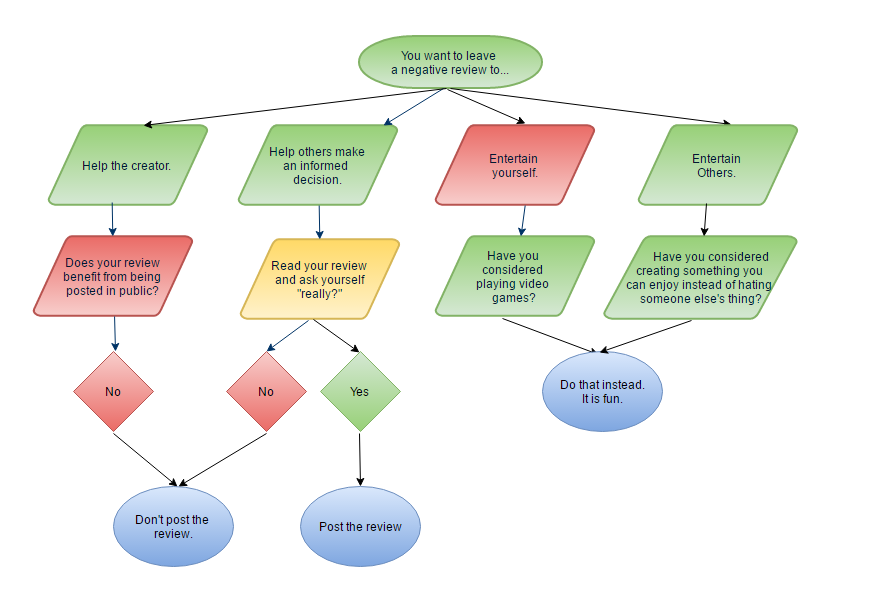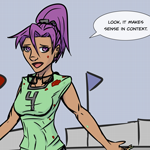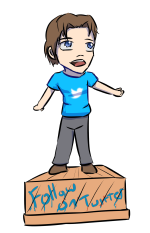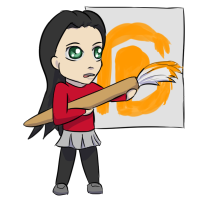Anyone who creates stuff for a living can tell you that criticism is a necessary tool for sculpting your craft. Anyone that creates stuff for a hobby can tell you that criticism is usually a downer.
The Black and White Nature of the Internet.
Over the course of publishing The Far Side of Utopia, I’ve received quite a lot of feedback – some of it from people who frothed with hatred and some from who just wanted to let me know I was doing a good job. This dichotomy perfectly represents the internet’s bent toward extremism is, in turn, perfectly reflected in the two reviews I’ve received over the years. One, a glowing and optimistic endorsement by one of our readers, Delta-v. The other, a scathing review by a site dedicated to scathing reviews by a fellow over at “Bad Webcomics Wiki”.
Intellectually I know how to handle both kinds – appreciate the positive reviews, and parse the negative reviews for actual content lodged in the bile and not let them get to you. Intellectually I know that on the internet opinions tend to swing to the extremes because it’s a medium that lends itself to echo chambers and reinforced opinion. Intellectually I know that only someone that loves or hates something will bother to review it. In practice it tends to be somewhat bitter pill to swallow when you have something ranting about how your work is shit.
A Hobbyist Creator’s Guide to Reviewing work:
Criticizing something is not bad. Even if you have the need to point out the flaws of being their work, this can be an intrinsic part of helping a creator get their work to the next level. Publishing your criticism on public forums walks a dubious line.
I’ve created a chart to help people navigate that line:

Realistically if your interest is actually in informing the creator of the flaws of their work, an email conversation can get you much further. Adopting a friendly and conciliatory tone can get you so much further. When you start from the position of declaring from a podium that their work is basically shit, it’s going to take a saint to read next paragraph as serious criticism.
My Response the Content Review Itself:
Hmm. Yuuup, more or less.
Okay, folks, we’re done here.




I generally only comment if I feel like there is some humor I can share that everyone might enjoy. Not helpful for a critique but I can’t draw myself and probably could pull off an 800 word story at the longest. I dislike hypocrisy so I am not going to tell you you should do something better when what you already do is better than what I could.
For an encouraging thought I found your comic back in May (2016) and have read it start to finish 3 times now because as others have noted the story is that good. The art doesn’t reduce my enjoyment and as someone else mentioned it is now what I expect. Don’t read that as “in spite of” it is not how I meant it. You are not satisfied with your artwork so if I tell you it is good I doubt you’ll believe me, fortunately Delta-V has the credibility to help you out there.
As much as I enjoy comments and think they are cool way for readers to engage with the story and each other, I definitely understand as I personally very rarely leave comments on other comics because I cannot usually think of anything ‘interesting’ to say 😛
I’m really glad you found my comic and enjoy it! It’s my feeling that we’ve yet to really hit our stride here, but I’m always thrilled when people are enjoying the journey to getting there. I’m always amazed when people tell me they’ve read the story multiple times, as I doubt there are many writers out there not haunting by the vague sense of ‘maybe none of this makes sense…’ 😀
As for the art, well, I will try to take the vote behind @Delta-V’s eternal optimism to heart 😉 That said, it’s something I know that I have a ways to go, but am satisfied that I have at least improved. I always welcome constructive criticism on it, but I’m glad to hear that it’s a hurdle that people can get over. I do wish I had time to redraw more of the early pages, as I think those are a bit of a barrier for new readers, but it’s not something I can let in the way of marching onward with the story.
Really appreciate the comment, the kind words, and above all hearing that you’ve been enjoying the story!
Making a negative review public means that people other than the critic and creator can talk about it, so the creator gets a better sense of how the community feels rather than how the critic feels.
Also, we have a word for negative reviews meant for entertainment, they’re called “satire”.
It’s possible that I’m missing the point, but I don’t see most of the content over there as satire. Satire tends to more rely on caricature and irony.
That it provokes discussion is a good point and one that I lack the prospective on this matter to realize and appreciate I suppose.
This is thoughtful. I especially like the flowchart and how it addresses the intention of writing the review. It’s hard to stress this too much: If a negative review is written to entertain oneself or others, then it’s done for the wrong reasons.
” Criticizing something is not bad. ”
But it’s important to make a distinction on whether or not criticism is constructive. If it is, then the creator can learn something to improve. If it is neither constructive nor informative, then it is likely pointless vitrol.
“…and parse the negative reviews for actual content lodged in the bile…”
Except, I don’t believe anyone should have to wade through bile in a “review” to find actual content. Overly harsh or not, reviewers should strive be informative and mature.
If a “review” does not inform, then it is mere opinion. And people have different tastes. Media such as literature and especially art and music are incredibly subjective.
To describe an aspect of a work with words like “terrible” or “bad” is not informative. It brutally vents their opinion without explaining their problem with it because they were too lazy to do so.
” …criticism is usually a downer. ”
True. Though, being ignored can feel worse. Some time ago I attempted fanfiction and, let me tell you, it’s difficult when nobody seems to want to read it or give any feedback, harsh or otherwise. I would have greatly appreciated even one harsh review as it would let me know at least one person reads it and if it helped me learn to write better.
Great comment across the board. I tend be pretty supportive of the concept of critics even when poorly phrased, as giving criticism in a constructive manner is a skill in and of itself that. But when someone is posting to somewhere that contains “bad” in the title I remove some of the benefit of the doubt from intentions.
Though you have great points across the board I think the one that is the most important is the last. I think deafening silence is harder to deal with then any criticism, and that’s pretty much the first trial any creator faces.
I think I didn’t get a comment for most of the first year, and compared to that getting a handful of people saying I suck is basically a walk in the park. This also the reason I hesitate to respond dismissively to critique in general, though as noted that benefit of the doubt decays in proportion to how much of a spectacle they aim to make it. There is a bit of grass is always greener there, but marching forward in silence is certainly deceptively hard.
I know that some of the early commenters here may very well have saved this story for being another orphaned project. That I’ve had wonderful people to join and read and speculate and theorize and contribute along is probably the thing I appreciate the most of this project.
I think it’s more that the majority of the people who are in the middle just don’t get passionate enough about things to leave reviews. I think this is a perfectly fine comic myself, but I haven’t reviewed it anywhere because it is neither my favorite, nor least favorite comic. I am interested in seeing where the story goes, so I keep reading it.
I do note this, and it’s very true. This is totally understandable as well, and not something I’m bemoaning. I mean, I read dozens of webcomics and rarely leave a comment even on the ones that are my favorite. Is just one the factors in the love it or hate it nature of feedback.
Appreciate the thoughts, and hope you continue to enjoy 😉
I’m disappointed that neither review mentioned what I think is one of this comic’s greatest strengths: its realism.
Firstly, its more realistic portrayal of AI – things like Mium’s utter disregard for its body compared to its brain. For comparison, the other comics I read with AI are QC and NAV. The former portrays them as human-like, although they do have a few brief side-arcs where other (more realistic) AI appear in the background; the latter, we haven’t seen enough interaction with the AI to tell. Maybe its just that I’ve read so much of Yudkowski’s work, but I really like that feature here.
Secondly, that “loads and loads of characters” aspect. Most of the time, people do not only know, say, six people, and it isn’t always clear who is and isn’t important. While this does lead to problems identifying people, I think those become less and less important as the story goes on.
The characters are realistic, particularly your intelligent characters, which make genuinely smart decisions and realistic mistakes. Those three features (plus a fairly reliable update schedule) make this one of my favorite comics.
That said: I’d say criticisms about the art and proofreading are fair, but (a) acknowledged and being worked on and (b) unimportant, really. The art, at least, has now gotten to the point where I consider it “as good as it needs to be; stylistically unique and recognizable” – and the latter is important. I wouldn’t call old OOTS art, for instance, “good” – and yet it’s still one of the biggest webcomics, because at the end of the day, some webcomics live on art, and some live on their story.
If I had a point of criticism (aside from certain “low-budget” aspects of it; e.g., the lack of an independent editor to proofread), it would be the action sequences. They’re the only problem I’ve had with the art, and (in all fairness) that’s one of the hardest parts of artwork anyway. Might be worth showing someone who doesn’t read your comic such pages (presumably in a sketch form) and asking “which way do your eyes read the panels?” now and again, just to make sure its clear.
All other issues are fine as-is, although it’d be good to clean up your earlier work if you ever wanted to take it into book form (as most webcomic authors do).
Appreciate the comment – and I don’t mean it lightly as you’ve put both effort and thought into this feedback. Something like this is both great to hear and useful to absorb.
Across the board this was a great follow up, and pretty much anything I can say here would just be repeating you.
I do want to acknowledge that I share the concerns on the action sequences. Essentially the action scenes are built off a general idea of what happens and a few ‘frames’ I rarely really have the talent to draw. Then I sort of try to connect the dots in a logical sense. It’s a weakness that comes from that I’m mostly a book reader, I think. I don’t much read comics or watch TV, so the foundations of good shots are something that doesn’t come naturally to me. In a book you don’t have to worry about the eye path and action flow – these aren’t reasons to not do better, but reasons I think there is further to go there. Well, that and doing a good action scene is probably hard.
Really appreciate the kind words, and appreciate even more that you’ve been enjoying the story.
I second this comment.
He lists the three of the four things that I think make this comic worth reading.
Characters all seem to be important and they ALL seem to have their own thoughts and agendas. This makes it chaotic and unfocused, but so much more real.
The heroes are realistic. Peter is annoying. Peter does whine. Peter is NOT always right. But it makes it so much more believable that he is a very clever human trying to juggle a very complex plot.
And the AI is uniquely well written. The review talks about Mium being hard to figure out. That is the point, at least how I see it. Mium only acts like a human for convenience, and it is only an act. He has his own personality too I think, which makes it even better, but it only adds context or flavor to the character he is using at the time.
The last thing is that I am a giant nerd and love the huge walls of text on the info sections. But that is just me because I am special.
Anyway, don’t get discouraged. Yes, there is a lot that could be better. As the review itself demonstrates but then seems to ignore, you’ve gotten better as a factor of time.
Appreciate the input, and glad you enjoy endless walls of the text! 😉
We’ll see what we can do about making this comic better as we go 😀
If you want to improve and haven’t read Scott McCloud’s “Understanding Comics”, go read it. If you have read it, read it again; some of it obviously didn’t sink in the first time.
Looking at this comment again, it reads a lot more condescending than was intended. Sorry!
No problem.
Scott McCloud’s Understanding Comics is probably the most common piece of advice given to comic creators, and it’s not necessarily bad advice.
Knowing the pieces you have to put together, though, and actually assembling them are a fairly large gap. On the quiz ‘How do you make a good comic’ I’m fairly certain I could get all the none subjective answers easily 😉 But putting them into a comic… well, it’s a bit of different.
Action flow is a good example. It’s something that most people understand – you want a clear path of what is happening on a page from top left to bottom right; but this doesn’t work with a fractured page layout or a traditional boxes layout – this major reason that traditional action comics and manga almost always use breakout characters or floating panels, using a main central or ending splash that’s much larger.
Sure, it reads better, but it’s not only a lot harder to draw (the larger you draw a character, the better you have to draw them) but it also means that you’ve lost a lot of page real-estate, which is why you also tend to see the absurdly long speech bubbles mid action as they have to catch up to that.
That’s not to say that you don’t need an action flow, but it’s also not as simple (in my mind) as drawing a curved line down your page.
None of this is say that traditional advice on how to make comics is wrong, nor to claim that I know better. But it’s more like reading a cookbook to get better at cooking. Sure, it helps, but it’s not going to make you a brilliant chef overnight, and if you spend your time reading instead of cooking, everyone goes hungry 😉